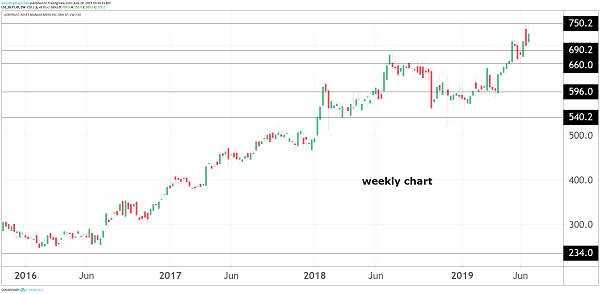Stockwatch: A great company, but shares may be high enough
A prime example of current market optimism, our analyst asks if risk outweighs reward for this share.
28th June 2019 11:10
by Edmond Jackson from interactive investor
A prime example of current market optimism, our analyst asks if risk outweighs reward for this share.

Has small-cap fund manager Liontrust Asset Management (LSE:LIO) - capitalised at £370 million, with over £14 billion of assets under management – re-asserted a bull trend, or does it more likely exemplify investor complacency amid economic and political risks?
The chart has shown strong, near-linear growth from 235p in 2016, interrupted only by last autumn's debacle when investors worried that the US Federal Reserve was finally tightening monetary policy. In response to latest full-year results, Liontrust shares rose 4% to an all-time high of 750p before profit-takers clipped it to 735p currently.
Markets have soared a year after Fed officials changed to soothing overtures from Christmas Eve onwards, it being assumed they are once more open to interest rate cuts to sustain the US economy. Meanwhile, there are deep differences between the US and China on trade and technology, despite superficial talk of a deal.
Latest analysis by Deutsche Bank also cites a sudden reduction in corporate earnings estimates - especially in the US, Japan and emerging markets - after an improvement since last December.
Thus, potentially, we are again at an inflection point: equities not quite exuberant, yet exposed to a reality check. That's taking a global macroeconomic view, before political risks such as Iran, and Guy Verhofstadt asserting that Tory leadership candidates have no chance of the EU agreeing to their Brexit proposals.
Fund manager shares: more volatile than markets
Fund managers' underlying revenues derive from sentiment in terms of demand/supply balance for funds, and overall market sentiment affecting the value of financial assets under control. So, they are great to hold when a bull market is underway: profits soar once fixed costs are covered, assuming the managers don't devise schemes to take proportionately more in bonuses etc.
A decade after equities started rising following the global financial crisis, most fund managers, including Liontrust, have realised the need to hedge exposure to equities, and have diversified to offer bond and "multi-asset" funds. However, most financial assets tend to drop in a financial crisis, which is why "falling markets" heads the list of key risks in note 9 to Liontrust’s accounts. Operational gearing can then work somewhat oppositely for profits.
Having initially drawn attention at 110p in October 2012 as a buy-and-hold pick, and re-iterated this over the years, last October at 650p I changed stance to suggest 'take profits'. I conceded an aspect of commentator part-trying to preserve a good call, that 'sell' would be overly harsh. But it seemed the Fed was genuinely, finally, tightening policy after a decade of stimulus that had played a big part in rising asset values.
My sense remains not to push luck too far, especially in cyclical stocks, however good the quality. I pointed out that Liontrust would need to drop nearer 500p to exact a 5% yield by way of support, and indeed it fell to 530p last autumn. With the Fed changing its tune and corporate earnings staying robust – at least until June – markets, and especially Liontrust shares, have soared back up.

Source: TradingView Past performance is not a guide to future performance
Growth rates are moderating somewhat
Its annual results to 31 March 2019 show revenue/profit/earnings all up 10% on an underlying basis – if more modestly than a year ago when revenue soared 49%, adjusted pre-tax profit by 59% and earnings per share (EPS) by 43%.
Discerning growth rates is made complex, however, by amortisation and incentives' costs whittling down profit: note 5 to the accounts shows pre-tax profit up 55% to £19 million before a raft of other expenses, chiefly £4.8 million for share incentivisation and a £3.1 million "DBVAP" expense that needs explaining better, though appears share-related, part of the way publicly-listed city firms tend still to behave as if private partnerships.
They will say such benefits are essential to attract and retain quality management, although with the cash flow statement showing the dividend payout at £11.5 million, the opportunity cost is a significantly higher dividend that could reduce stock volatility if markets turn down.
| Liontrust Asset Management - financial summary | ||||||
|---|---|---|---|---|---|---|
| year ended 31 Mar | 2014 | 2015 | 2016 | 2017 | 2018 | 2019 |
| Turnover (£ million) | 28.5 | 36.8 | 45.0 | 51.5 | 85.8 | 97.6 |
| IFRS3 pre-tax profit (£m) | 3.2 | 7.3 | 9.4 | 9.1 | 12.3 | 19.0 |
| Normalised pre-tax profit (£m) | 3.7 | 7.3 | 9.5 | 9.3 | 12.5 | 30.1 |
| Operating margin (%) | 13.1 | 19.8 | 21.1 | 17.8 | 27.4 | 19.5 |
| IFRS3 earnings/share (p) | 4.6 | 13.6 | 16.1 | 14.8 | 16.8 | 32.6 |
| Normalised earnings/share (p) | 5.8 | 13.6 | 16.3 | 15.3 | 42.7 | 46.9 |
| Price/earnings multiple (x) | 15.6 | |||||
| Annual average historic P/E (x) | 22.3 | 18.6 | 28.3 | 26.2 | 17.7 | |
| Cash flow/share (p) | 18.7 | 10.2 | 17.8 | 24.2 | 47.3 | |
| Capex/share (p) | 0.4 | 0.2 | 0.2 | 9.2 | 0.4 | |
| Dividend per share (p) | 2.0 | 4.0 | 9.0 | 13.0 | 21.0 | 27.0 |
| Yield (%) | 3.7 | |||||
| Covered by earnings (x) | 3.6 | 3.6 | 1.9 | 1.2 | 2.3 | 1.7 |
| Net tangible assets per share (p) | 30.0 | 41.2 | 52.0 | 50.4 | 46.4 | 48.7 |
| Source: Company REFS |
Management benefits temper dividend payouts
Otherwise, the latest cash flow statement affirms what the table shows: strong cash generation of £13.3 million after tax, if down from £24.6 million for 2017/18, versus miniscule investment needs. It's a good business model for shareholder returns but the problem for corporate governance - like anywhere – is directors appointed by the board, thus the interests of directors prevail over shareholders.
- A turning point for this share?
- Click here for top City analyst Jeremy Grime's review of financial stocks making the headlines
Not to labour the point, but if market/investor sentiment changes more definitively than last autumn, where's the yield prop? Liontrust's dividend has risen 29% to 27p, representing a 3.7% yield covered 1.7 times by adjusted diluted earnings. So, taking a more cautious view of halving that growth rate in payout to say 15% for 31p a share, implies a prospective yield of 4.2%. A market crisis, and share price drop to say 600p, implies 5% or better, although it's unclear whether that's a prop.
It's fair to say that with £35.5 million cash as of last March, Liontrust does at least have reserves to maintain dividend growth through a change in market sentiment, but maybe not a recession, we don't know.
Compare and contrast with Jupiter Fund Management
Jupiter Fund Management (LSE:JUP) yields 6.7% with its stock currently around 430p, based on its 2018 dividend of 28.5p and its stock down from 630p in the last 18 months. It shows how if a growth profile gets undermined - Jupiter has seen a 15% decline in assets under management to £42.7 billion and profit down 7% - then the market can be pretty ruthless on a fund management stock to exact higher yield.
Liontrust's performance suggests better management than Jupiter’s, but remains quite at the mercy of financial asset values and investor demand for its funds.
In its last financial year, Liontrust achieved record net inflows of £1.8 billion, a 77% increase, which meant a 21% increase in funds under management. For context, market movements accounted for £0.4 billion of asset growth.
Demand is reflected by Liontrust enjoying the seventh highest net sales in the UK during 2018 and the fifth highest during the first three months of 2019, across a broad range of funds. Three new bond funds – strategic, high yield and absolute return – based on hiring new investment managers, raised £419 million within a year.
"Selling half" appears a fair compromise
It's possible that markets will judge US and Chinese Presidents Trump and Xi as having agreed a fair-enough truce to quell fears of an escalating trade war. And also that central banks resume stimulus measures, hence equities and bonds remain in demand for investors who don't want to see cash rotting in banks.
My dilemma with this stock is quite easily envisaging say 20% downside risk to 600p as realities bite, with less confidence in a similar percentage advance to 875p in the next year or two. So, at around 735p and versus global and domestic risks after a 10-year bull run in financial assets, I see the risk/reward profile for Liontrust shares suggesting it's time to protect gains. It's why my stance remains that while it's harsh to say 'sell', locking in gains according to your risk tolerance seems sensible. Take Profits.
Edmond Jackson is a freelance contributor and not a direct employee of interactive investor.
These articles are provided for information purposes only. Occasionally, an opinion about whether to buy or sell a specific investment may be provided by third parties. The content is not intended to be a personal recommendation to buy or sell any financial instrument or product, or to adopt any investment strategy as it is not provided based on an assessment of your investing knowledge and experience, your financial situation or your investment objectives. The value of your investments, and the income derived from them, may go down as well as up. You may not get back all the money that you invest. The investments referred to in this article may not be suitable for all investors, and if in doubt, an investor should seek advice from a qualified investment adviser.
Full performance can be found on the company or index summary page on the interactive investor website. Simply click on the company's or index name highlighted in the article.
Disclosure
We use a combination of fundamental and technical analysis in forming our view as to the valuation and prospects of an investment. Where relevant we have set out those particular matters we think are important in the above article, but further detail can be found here.
Please note that our article on this investment should not be considered to be a regular publication.
Details of all recommendations issued by ii during the previous 12-month period can be found here.
ii adheres to a strict code of conduct. Contributors may hold shares or have other interests in companies included in these portfolios, which could create a conflict of interests. Contributors intending to write about any financial instruments in which they have an interest are required to disclose such interest to ii and in the article itself. ii will at all times consider whether such interest impairs the objectivity of the recommendation.
In addition, individuals involved in the production of investment articles are subject to a personal account dealing restriction, which prevents them from placing a transaction in the specified instrument(s) for a period before and for five working days after such publication. This is to avoid personal interests conflicting with the interests of the recipients of those investment articles.